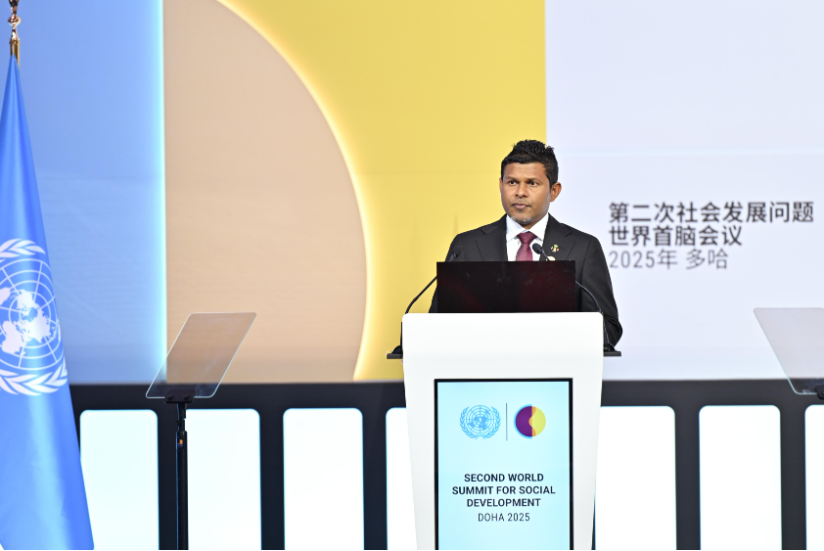DOHA, Qatar — In the gleaming halls of the Qatar National Convention Centre, where world leaders gathered beneath crystal chandeliers to renew a 30-year-old promise of social justice, one absence stood out. The Maldives, a nation of just 298 square kilometres of coral atolls, was represented not by its president but by his deputy.
At the Second World Summit for Social Development — a rare gathering of heads of state meant to salvage the fraying threads of global equity — Vice President Hussain Mohamed Latheef delivered a careful appeal for debt relief and resilience funding. His words were measured, even eloquent. Yet they skimmed past the Maldives’ own remarkable journey from poverty to near-universal prosperity.
This was not the first time President Dr. Mohamed Muizzu had stepped away from the global stage. In September, he skipped the United Nations General Assembly in New York, a rite of passage for nearly every Maldivian leader since the country joined the world body in 1965. Then, too, a minister filled in while the president stayed home to focus on domestic politics. Now, as the Doha summit enters its second day, President Muizzu is elsewhere — island-hopping across the Suvadiva Channel in a frenetic push to rally support for looming local council elections.
The pattern has raised uneasy questions about priorities in a country where rising seas pose an existential threat. For a nation whose very survival depends on global action, silence in international forums risks muting a story that has long inspired others.
That story is one of improbable ascent. Three decades ago, in Copenhagen, Maldivian delegates signed onto the declaration that Doha now seeks to revive. At the time, the Maldives was classified as a Least Developed Country, with a per capita income of just $800.
Back home, those pledges sparked a quiet revolution. Extreme poverty, which afflicted 14 percent of the population in 1997, fell below 1 percent by 2015 — years ahead of the Millennium Development Goals. Universal primary education became a reality, with enrolment rates reaching 99 percent and adult literacy climbing to 98 percent, the highest in South Asia. Maternal mortality dropped by three-quarters, from 100 deaths per 100,000 live births in 1990 to 25 by 2015, thanks to a free healthcare system that now covers every citizen, at home or abroad.
These are not abstract figures. They are lifelines woven into the daily lives of 520,000 Maldivians scattered across hundreds of islands. The universal old-age pension system — the first of its kind among small island states — ensures no elder is left behind. A digital economy strategy promises to lift GDP by 15 percent by 2030, bringing subsidies and health records to even the most remote atoll through a smartphone screen.
Social change has been just as striking. Girls now outpace boys in higher education, making up 60 percent of tertiary enrolment. Women’s participation in the workforce has doubled to nearly half. And as climate change threatens to submerge 80 percent of the land, the Maldives has pioneered a $500 million domestic climate fund, taxing luxury tourism to build sea walls alongside social safety nets.
The arc of this transformation culminated in 2011, when the Maldives became the first small island developing state — and only the third country ever — to graduate from LDC status. The Sustainable Development Goals, adopted in 2015, found fertile ground here. In its 2023 review to the United Nations, the Maldives reported that 70 percent of its targets were on track, with a development score above the global average.
It is a record that might have resonated in Doha, where leaders are searching for proof that the Copenhagen vision can still be salvaged. Instead, the Maldives’ most compelling advocate was absent — again.
It is a narrative of resilience, one that might have electrified Doha’s plenary sessions and offered a blueprint for debt-burdened nations from the Pacific to the Caribbean.
Yet in Vice President Hussain Mohamed Latheef’s address on Tuesday — a 650-word distillation of small island solidarity — those victories were little more than footnotes. “We have achieved universal old-age pensions… and have established universal health coverage,” he said in passing, tucked between broader indictments of global debt traps and climate inequities.
There was no mention of the Maldives’ graduation from Least Developed Country status, that hard-won emblem of Copenhagen’s promise fulfilled. No nod to the eradication of poverty that predated the Millennium Development Goals. No reference to the digital ID system now transforming service delivery across the islands.
Instead, the speech leaned on generic invocations of “SIDS like the Maldives.” It read less like a victory lap than a supplicant’s brief: four paragraphs on debt-to-resilience swaps, but little evidence of how the Maldives has already pioneered such alchemy by channelling tourism levies into infrastructure that doubles as climate defence.
The vice president’s oration was diplomatically polished — capped with a stirring triad, “words must become commitment, and commitment must become action.” But it lacked the narrative arc to humanize the data. In a summit billed by Secretary-General António Guterres as a “booster shot for development,” the Maldives appeared not as a pacesetter but as a perennial victim: eloquent in its asks, evasive in its proofs.
That framing shortfall dovetails with President Muizzu’s conspicuous absence — the second in a string of high-stakes no-shows that underscore a presidency focused on the granular. Elected in 2023 on a nationalist “India Out” platform — a vow to expel Indian troops and tilt toward Beijing — President Muizzu has since consolidated power. His People’s National Congress swept parliamentary elections in April 2024, securing a supermajority in the Majlis and clearing the way for ambitious housing drives and infrastructure overhauls.
Now, that momentum has shifted to the hyper-local. Local council elections, provisionally slated for early 2026, will refresh the island councils that manage everything from waste collection to daily governance. With polls on the horizon, President Muizzu has reinvented himself as an island-hopping campaigner. He has become the first president to visit every inhabited island in record time, touting subsidized housing, youth job programs and new airports in town halls packed with islanders.
There is logic to the strategy. Local councils, empowered by the 2010 Decentralization Act, wield unusual influence in a nation where 90 percent of the population lives outside Malé. They are the very levers of the Copenhagen agenda. President Muizzu’s island odyssey is not mere politicking; it is a form of micro-diplomacy, blending photo opportunities with policy pledges.
Supporters hail it as authentic leadership. Yet the tension is clear: between the intimate scale of island governance and the outsized geopolitical stakes of a 900,000-square-kilometer exclusive economic zone. The Maldives is not just another small island state. It is a fulcrum in the Indian Ocean, where China’s Belt and Road largesse — $1.4 billion in loans since 2014 — collides with India’s “Neighbourhood First” overtures.
Skipping both the United Nations General Assembly and now Doha feels more pointed. This summit was tailor-made for President Muizzu to narrate his nation’s improbable success story. As a graduate from Least Developed Country status and a leader on the Sustainable Development Goals, he could have seized the stage: “We turned Copenhagen’s words into atoll-proof action — now help us scale it against the tide.” Instead, the vice president’s generic appeals to small-island solidarity left many Maldivians lamenting “missed medals.”
The criticism stings more when set against President Muizzu’s own rhetoric. His nationalist message, cantered on putting the Maldives first, calls for a foreign policy that amplifies Maldivian voices abroad. Yet by outsourcing Doha and framing the Maldives as a nation trapped by debt rather than as a social innovator, he risks reinforcing the very stereotypes of small-state fragility he has vowed to transcend.
To be fair, the presidency’s burdens are immense. Financing gaps after graduation from LDC status stretch to $1.4 billion a year, compounded by the pandemic’s debt overhang — now 120 percent of GDP — and the volatility of tourism, which sustains nearly a third of jobs. President Muizzu must juggle economic survival with governance in a polity as unpredictable as the waves breaking on its reefs.
Local elections, meanwhile, loom as a firewall against reversal: a sweep by his People’s National Congress could entrench the National Development Plan (2023–2027), fusing the Sustainable Development Goals with megaprojects like the RasMalé housing vision. Yet the strategy risks veering toward shortsightedness.
Global forums like Doha are not optional networking; they are multipliers. The Political Declaration adopted Tuesday — billed by Secretary-General António Guterres as a “booster shot” — pledged fiscal space for social investment, including a new Global Alliance Against Hunger and Poverty launched by Qatar and Brazil. With President Muizzu absent, the Maldives missed bilateral huddles with funders such as France, co-host of the Doha Solutions Forum, and the IMF, where debt-swap pilots might have advanced. The narrative void ceded ground to rivals: while Vice President Latheef invoked “no island left behind,” larger players like India showcased “last-mile” empowerment models, subtly eclipsing Maldivian innovations.
In the end, President Muizzu’s island-hopping campaign embodies the Maldives’ paradox: a speck of paradise punching above its weight, yet tethered to the tangible. As waves lap higher on Addu’s shores, the question lingers: can a president who masters the island vote afford to forfeit the global one? Doha’s echoes suggest not.
For a nation that once turned Copenhagen’s whispers into roars, the greater danger now is not absence from summits but absence from its own success story. The Maldives’ hard-won narrative as a small island state that pioneered social development risks being rewritten in Doha by others, rather than carried forward by Maldivians themselves.












